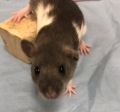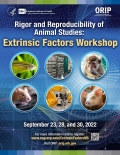

Enhance Rigor and Reproducibility in Animal Research by Managing Extrinsic Factors
When: September 23, 28, and 30, 2022
Venue: Zoom
Register: scgcorp.com/ExtrinsicFactorsWS
The workshop will be a forum to discuss the current status of and needs for understanding extrinsic environmental factors; their potential impact on animal research outcomes; and how facilities may optimally manage, monitor, and report these extrinsic factors in an effort to enhance reproducibility and rigor in animal research. The focus of this workshop will be on identifying gaps, opportunities, and new approaches in husbandry of commonly and widely used animal models; relevant environmental factors and conditions; and the need for novel instruments, equipment, and infrastructure for animal research core facilities (e.g., modern design of research core facilities, high-throughput equipment, telemetry for behavioral research).
Osmotic tolerance limits and effects of cryoprotectants on the motility, plasma membrane integrity and acrosomal integrity of rat sperm. Si W, Benson JD, Men H, Critser JK. Cryobiology. 2006 Dec;53(3):336-48.
Vibration study of the Piezo-driven pipettes immersed in viscous liquids. Fan M, Agca Y, Critser JK, Feng F. Journal of Applied Physics 2006; 100(7):74701-74708.
Changes in rat spermatozoa function after cooling, cryopreservation and centrifugation processes. Kim S, Agca C, Agca Y. Cryobiology. 2012 Jun 30.
